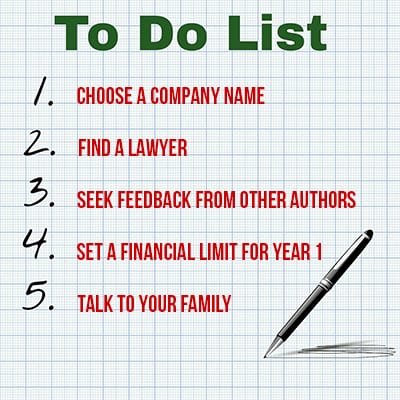You bought the book, but have you started writing your writer’s business plan?
Let’s face it, many people understand they need a business plan to have a successful writing business – but somehow they never get around to actually writing the business plan and that is a shame, because a business plan is such an important tool for growing your writing business.
I don’t want you to buy “The Writer’s Business Plan” and never actually write your plan. That is why the book contains short, easy to read chapters packed with so many tips, warnings and helpful notes. That is why I included the worksheets (and also provide them online to those who purchased the book.) I want you to write your business plan so you will realize your dream of a writing career.
Here are 5 things you can do before you write your business plan to get you excited about starting:
- Choose your company name.
Your company name is important! Choose one that you like, that is general enough to give you the ability to expand or eliminate services overtime. Then verify that it is not trademarked and that the URL is available!
- Find a lawyer and choose your legal structure.
You will need a good lawyer who understands the laws related to intellectual property rights, copyrights, etc. as they relate to authors. (There is information in The Writer’s Business Plan on how to find a good lawyer in your area.) A lawyer can talk to you about the pros and cons in your state relating to an LLC or a sole proprietorship for an author. Will you be doing workshops, running online classes or will you concentrate on using an agent and traditional publisher alone or in combination with self-publishing? A lawyer can help you decide what legal structure works best for you. An initial conversation won’t cost you much (ask for the fee when you book the appointment.) You can always incorporate later, but at least you will know the pros and cons of your decision.
- Talk to other authors who are following a model similar to the one you are contemplating.
If you plan to write, get an agent and have the agent submit to traditional publishers, then talk to a writer who is also following this model and ask if they will give you an informational interview to talk about your plans to follow the same path. Planning on self-publishing? Then approach someone who is self-publishing all their books. Whether you are doing a combination of both or plan to write a book, sell it on Amazon alone for a minimal amount and use the book to draw interest for your online courses, ask an author following the same approach for their opinion of your business plans. You may be surprised by the advice they give.
Warning: Don’t ask someone for an informational interview and then argue with them about strategy the entire time. That is a waste of their time and they won’t want to help you again. Take notes and if you disagree with their advice, keep it to yourself and thank them heartily for taking the time to help you. What you do with their advice after you leave is up to you but they have done you a big favor and you need to acknowledge that.
- Determine how much money you have to spend on your company for the coming year.
When you start treating your writing career as a business, you will be shocked at how many tools, software, courses, services, etc. people tell you that you HAVE to have. Show restraint. You won’t have a business long if you spend more money that is coming in. Create a budget and stick to it. When you create your business plan you will choose what you will purchase during the coming year WITHIN your budget. Building a business takes time. It is not done overnight. A website is a must. The latest e-marketing software is a nice to have – when you can afford it. That might be from the start, but if not, hold off until the income coming in from the writing can pay for the money going out.
- Prepare your family for the lifestyle changes that will happen over the next year as you take a professional approach to your writing business.
When you make the decision to treat your writing as a business, you make a commitment to spend time on all the different aspects of running a business that you didn’t do before. You read more about running a business. You learn more about keeping your financial books, about marketing your work, about how to find new audiences for your writing. If your business is very successful, you may find yourself traveling more. You may spend more time in your office.
This takes time and it usually takes more money than you put into your business previously. Talk to your partner about what these changes would mean for your lifestyle. Discuss the risks and how much risk you are both comfortable taking on over the coming year. Talk about the potential rewards and how much time you are both willing to give the business to start bringing in those rewards.
Once you have taken these 5 steps you will find you are ready and anxious to write your business plan. Act on that enthusiasm knowing you are embarking on the first step to your future business success.


Leave a Reply
We respect your privacy. Your email address will not be shared or sold.